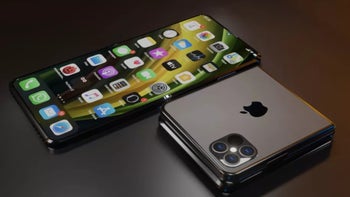Apple once again patents a foldable battery for its foldable iPhone

While companies like Samsung are releasing their third-generation foldable devices, Apple is yet to release a foldable iPhone. Sooner or later though, Cupertino will release a foldable device eventually (presumably sometime in 2023), and it's certain that lots of research and development is and will be invested into this future device. And speaking of foldable phones, one of the most crucial aspects is the battery, which is nowadays split into two or more separate units to allow for bending.
A recent patent application reveals that Apple might be working on an actual foldable battery in order to maximize and fully utilize all the space inside its future foldable device. How does Cupertinians plan on doing that? As per the patent filing, the foldable battery cell features a very slim middle section that would sit near the hinge. This would allow Apple to use a single battery unit in its foldable device and eke out as much capacity as possible out of the claustrophobic inner shell. The patent doesn't go into detail as to what the chemical properties of such a battery would be, and instead only focuses on the mechanical and physical aspect of things.
"The electronic devices may include a hinge section extending along a length of the first device section and a length of the second device section," it continues. "The second device section may be bendably coupled with the first device section about the hinge section. The hinge section may be characterized by a third thickness less than the first thickness and the second thickness," the patent application says.

Apple patent application for bendable battery
But why would Apple want to create an over-complicated bendable battery when two separate battery units would be a much simple and hassle-free approach, albeit wighing at a slightly lesser capacity? According to the patent, Apple isn't merely entertaining the idea for a foldable battery to merely increase battery capacity, but also provide "afford mechanical flexibility" to the foldable device.
This isn't the first foldable battery patent against Apple's name. Earlier in 2020, Apple explored separating a large battery cell into numerous much smaller battery cells rolled up in cylinders, which would allow for mechanical bending without compromising the chemical characteristics and properties of said cells.
While such patents might provide an insight at what technologies a company is secretly working on, it could also be a dead-end with no potential resolution at hand. For one, both approaches at developing flexible batteries will theoretically add some additional battery capacity, but they'll also overly complicate things, and certainly increase costs, both from a financial and R&D points of view.










Things that are NOT allowed: